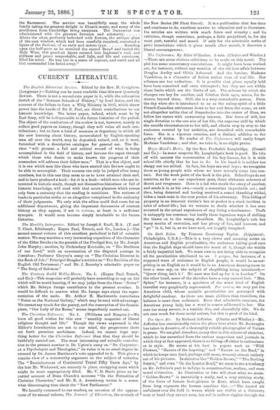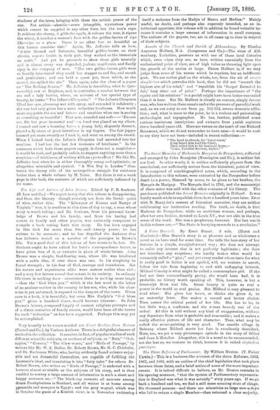The Open Air. By Richard Jefferies. (Cheat) and Windus.)—Mr. Jefferies
has unmistakably taken the place here which Mr. Burroughs has taken in America, of a thoroughly reliable photographer of Nature in prose. We are glad, therefore, to say that in this volume of sketches, which he has unearthed from the various magazines and journals in which they at first appeared, there is no falling-off either in enthusiasm or in style. He seems at his best in papers such as "Wild Flowers," "Haunts of the Lapwing," and "Nature on the Roof," in which he keeps man (and, perhaps still more, woman) almost entirely out of his pictures. In sketches like " Golden-Brown," " The Bathing Season," and even " On the London Road," we seem to see a tendency on Mr. Jefferies's part to indulge in sensationalism, realism, and even moral vivisection. An illustration or two will show what we mean. " Golden-Brown" is essentially a study, and a very striking study, of the faces of female fruit-pickers in Kent, which have caught from long exposure the human sunshine tint :—" The heated air undulates over the field in waves which are visible at a distance; near at hand they are not seen, but roll in endless ripples through the
shadows of the trees, bringing with them the actinic power of the sun. Not actinic—alembic—some intangible, mysterious power
which cannot be supplied in any other form but the sun's rays. It reddens the cherry, it gilds the apple, it colours the rose, it ripens the wheat, it touches a woman's face with the golden-brown of ripe life—ripe as a plum. There is no other hue so beautiful as this human sunshine tint." Again, Mr. Jefferies tells us how, "thrice blessed and fortunate, beautiful golden-brown on their cheeks, superb health in their gait, they walked as the immortals on earth." And yet he proceeds to show these girls mentally and in almost every way degraded, jealous, murderous, and finally tipsy in the company of men. "The two golden-brown girls were so heavily intoxicated they could but stagger to and fro, and mouth and gesticulate ; and one held a quart pot, from which, as she moved, she spilled the ale." Then, again, take the close of a paper on "The Bathing Season." Mr. Jefferies is describing what he (pre- sumably) saw at Brighton, and, in particular, a combat between the sea and a lady bather, whom, on account of her special type of beauty, he terms " The Infanti-Cleopatra." " The Infanta Cleopatra lifted her arm, gleaming wet with spray, and extended it indolently ; the sun had only given her a more seductive loveliness. How much more enjoyable the sea and breeze and sunshine when one is gazing at something so beautiful ! That arm, rounded and soft-- Excuse me, Sir, but your immortal soul ' —a hand was placed on my elbow. I turned and saw a beaming face ; a young lady, elegantly dressed, placed a fly-sheet of good intentions in my fingers. The fair jogger beamed yet more sweetly as I took it, and went on among the crowd. When I looked back, the Infanta Cleopatra had ascended into her machine. I had lost the last few moments of loveliness." In the contrasts which both these papers supply, is there not a suspicion— it would be rash, and probably unfair, to suggest anything more than a suspicion—of trickiness, of writing with an eye to effect ? We like Mr. Jefferies best when he is either thoroughly sunny and optimistic, or altogether miserable and cynical. "A Wet Day in London" illus- trates the dreary side of the metropolitan struggle for existence better than a whole volume by M. Taine. But there is not a weak page in this book, the contents of which are sufficiently indicated by its name.



































 Previous page
Previous page